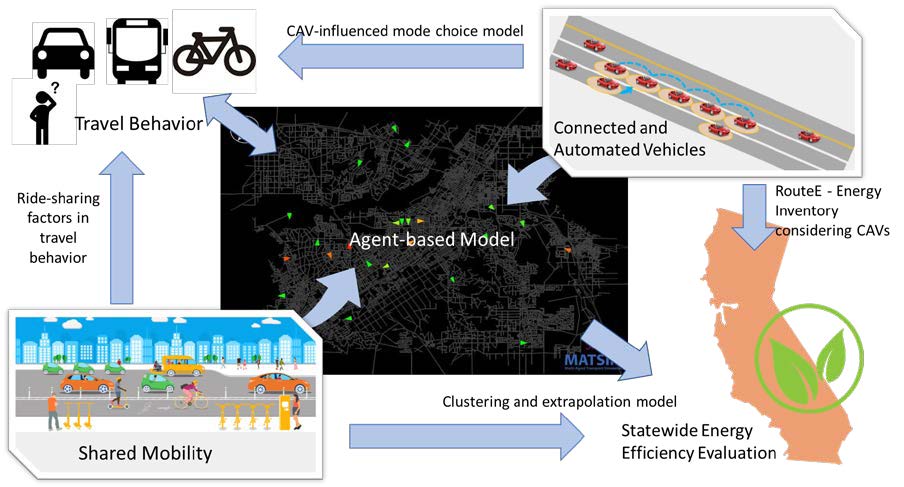Overview
CE-CERT has a number of shared mobility research projects, focusing on alternatives to personalized vehicle ownership and utilization. From 1996 through 2005, CE-CERT pioneered research in one-way carsharing systems, developing simulation modeling tools and also demonstrating these concepts with the UCR IntelliShare system. More recently, CE-CERT researchers are examining micro-mobility solutions and also investigating the energy impacts of shared mobility systems. The shared mobility programs provide a model in which operational aspects such as the type of vehicle (electric, fuel cell, or other alternative fuel), application software, and community infrastructure may be evaluated.
Projects
-
Department of Energy
Evaluating Energy Efficiency Opportunities from Connect & Automated Vehicle Deployments Coupled with Shared Mobility in California
With the rapid growth of information and communication technologies, Connected and Automated Vehicles (CAVs) are deemed to be disruptive with the potential to significantly improve overall transportation system efficiency, however may increase vehicle miles traveled (VMT). Further, shared mobility systems are another disruptive force that is reshaping our travel patterns, with the potential to reduce VMT. CE-CERT has embarked on a two-year research project is to extensively collect data from vehicles and associated infrastructure equipped with CAV technologies from both real-world experiments and simulation studies mainly deployed in California, and develop a comprehensive framework for evaluating energy efficiency opportunities from large-scale (e.g., statewide) introduction of CAVs and wide deployment of shared mobility systems under a variety of scenarios. To quantify the combined impact of CAV and shared mobility on travel behavior, traffic performance and energy efficiency, a mesoscopic simulation-based model has been developed for mobility and energy efficiency evaluation considering the disruptive transportation technologies. For further details, see summary report.
Lead Researchers: Dr. Matthew Barth, Dr. Peng Hao, Dr. Shams Tanvir, Dr. Guoyuan Wu, Dr. Chao Wang
-
Innovative Mobility Program: Micromobility Research
Coordinated Operation of Shared Micro-mobility for a Sustainable City Transportation System
Shared use fleet services of bikes, e-bikes, and e-scooters are expanding rapidly in urban areas across the US. In 2018, this emerging form of mobility, often termed as ‘shared micro-mobility’ (SMM), generated 84 million trips in the United States. However, unrestricted operation of SMM poses challenge to the local agencies in terms of safety, asset management, and equity. In the past year, 44 pieces legislations were considered by states across the US to delineate SMM policies. In most cases, these policies are informed by a small number of studies based on limited quantitative information. Determining the specifics of policies is often difficult for city managers amidst uncertainties around impacts of SMM and potential conflicts in inter-agency policy objectives. The trade-off between system level benefits and risks of SMM needs further investigations. In this proposed project, we will 1) synthesize and inventory the current state and policies with specific focus on California; 2) develop an analysis framework to compare benefits and problems associated with SMM; and 3) identify opportunities for cooperative and synergistic multi-agency management of SMM to enhance transportation systems sustainability.
Lead Researchers: Dr. Shams Tanvir, Dr. Kanok Boriboonsomsin
-
TNC Predictions and Dispatch
Coming Soon
- StratosShare
